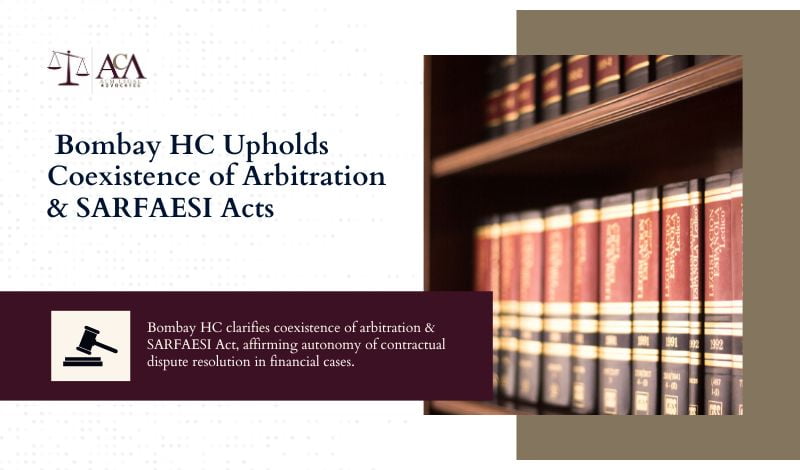In a pivotal judgement, the High Court of Judicature at Bombay, under the Ordinary Original Civil Jurisdiction, delivered a detailed analysis on the interplay between arbitration under the Arbitration and Conciliation Act, 1996, and enforcement proceedings under the Securitisation and Reconstruction of Financial Assets and Enforcement of Security Interest Act, 2002 (SARFAESI Act).
The bench, led by Justice Manish Pitale, shed light on this legal quandary through the cases Tata Motors Finance Solutions Limited vs. Naushad Khan c/o. Nazbul Hoda Khan (Commercial Arbitration Petition (L) No.8654 of 2022) and Tata Motors Finance Solutions Limited vs. Parveen Travels Pvt. Ltd. and another (Commercial Arbitration Petition (L) No.25821 of 2022), reserved on 18th October 2023 and pronounced on 20th December 2023.
Facts of the Case:
However, the jurisdiction of the High Court to entertain petitions under Section 9 of the Arbitration and Conciliation Act, 1996, was challenged by the Respondents. They contended that the Petitioner, being a financial institution under the SARFAESI Act, should proceed exclusively under that statute.
The crux of the disputes in question stems from loan agreements entered into by Tata Motors Finance Solutions Limited (Petitioner) with various clients, the Respondents in these cases. These agreements were specifically structured for the purchase of vehicles, under Loan-cum-Hypothecation-cum-Guarantee Agreements which contained arbitration clauses.
As per the agreements, the vehicles purchased with the loan amounts were to be hypothecated to the Petitioner as security. Initially, the Respondents adhered to the repayment terms, fulfilling their financial obligations by remitting periodic installments. However, as time progressed, the Respondents began defaulting on their repayments, which precipitated the invocation of the arbitration clauses by the Petitioner, seeking redress and enforcement of contractual obligations.
Despite these agreements explicitly incorporating arbitration clauses, following the invocation by the Petitioner due to defaults, the Respondents contested the High Court’s jurisdiction to entertain the arbitration petitions filed under Section 9 of the Arbitration and Conciliation Act, 1996.
Contentions of the Petitioners:
The core of the Respondents’ challenge was predicated on the legal interpretation that, since Tata Motors Finance Solutions Limited had been classified as a ‘financial institution’ under the Securitisation and Reconstruction of Financial Assets and Enforcement of Security Interest Act, 2002 (SARFAESI Act), it was obligated to pursue remedies exclusively provided under this specific legislative framework, rather than resorting to arbitration.
This contention brought forth a complex legal issue: whether the status of the Petitioner as a ‘financial institution’ under the SARFAESI Act inherently invalidated the contractual agreement to arbitrate disputes. The Respondents’ argument was essentially that the provisions of the SARFAESI Act took precedence over and excluded the contractual arbitration mechanism agreed upon in the loan agreements.
Points for Consideration:
The Court was poised to consider several pivotal points:
- Whether the SARFAESI Act’s applicability precludes the arbitration mechanism stipulated in the agreements between the parties.
- The impact of the Petitioner’s status as a ‘financial institution’ under the SARFAESI Act on the arbitration agreement’s enforceability.
- The jurisdiction of the High Court in granting interim measures under the Arbitration and Conciliation Act in light of objections based on the SARFAESI Act.
Analysis of the Court:
Justice Manish Pitale dissected the nuances of both the SARFAESI Act and the Arbitration Act. He clarified that the SARFAESI Act’s enforcement framework does not supplant the contractual agreement between parties to resolve disputes through arbitration. The Court noted that while the SARFAESI Act facilitates the enforcement of security interests, it does not encompass an adjudicatory process for determining debts, which remains within the arbitration’s purview.
The Court further differentiated between the SARFAESI Act and the Recovery of Debts Due to Banks and Financial Institutions Act (RDDB Act), underlining that the Petitioner’s status as a ‘financial institution’ under the SARFAESI Act does not equate to an automatic application of the RDDB Act’s provisions.
Justice Pitale observed that the provisions of the SARFAESI and Arbitration Acts operate in tandem and are not mutually exclusive. The enforcement measures under the SARFAESI Act kick in post the adjudication of disputes, which in this case, is through arbitration as agreed upon by the parties in their contracts. The judgement reinstated the sanctity of contractual agreements on dispute resolution mechanisms unless explicitly barred by legislation.
The Court, thereby, allowed the arbitration petitions and directed the initiation of arbitration proceedings while also granting interim measures to protect the Petitioner’s interests pending the resolution of disputes. The appointment of an arbitrator and specifics of the arbitration process were duly outlined.
Conclusion:
The Bombay High Court’s decision in these consolidated cases serves as a critical exposition on the coexistence of arbitration proceedings with statutory enforcement mechanisms under the SARFAESI Act. The judgement reiterates the autonomy of contractual obligations and underscores that the initiation of arbitration proceedings does not detract from the statutory rights and remedies available under specific legislations like the SARFAESI Act.
This ruling clarifies the landscape for financial institutions and their borrowers regarding dispute resolution and reaffirms the principle that arbitration, as an adjudicatory process, remains a viable and enforceable method, notwithstanding the special provisions for recovery and enforcement available to financial institutions.






